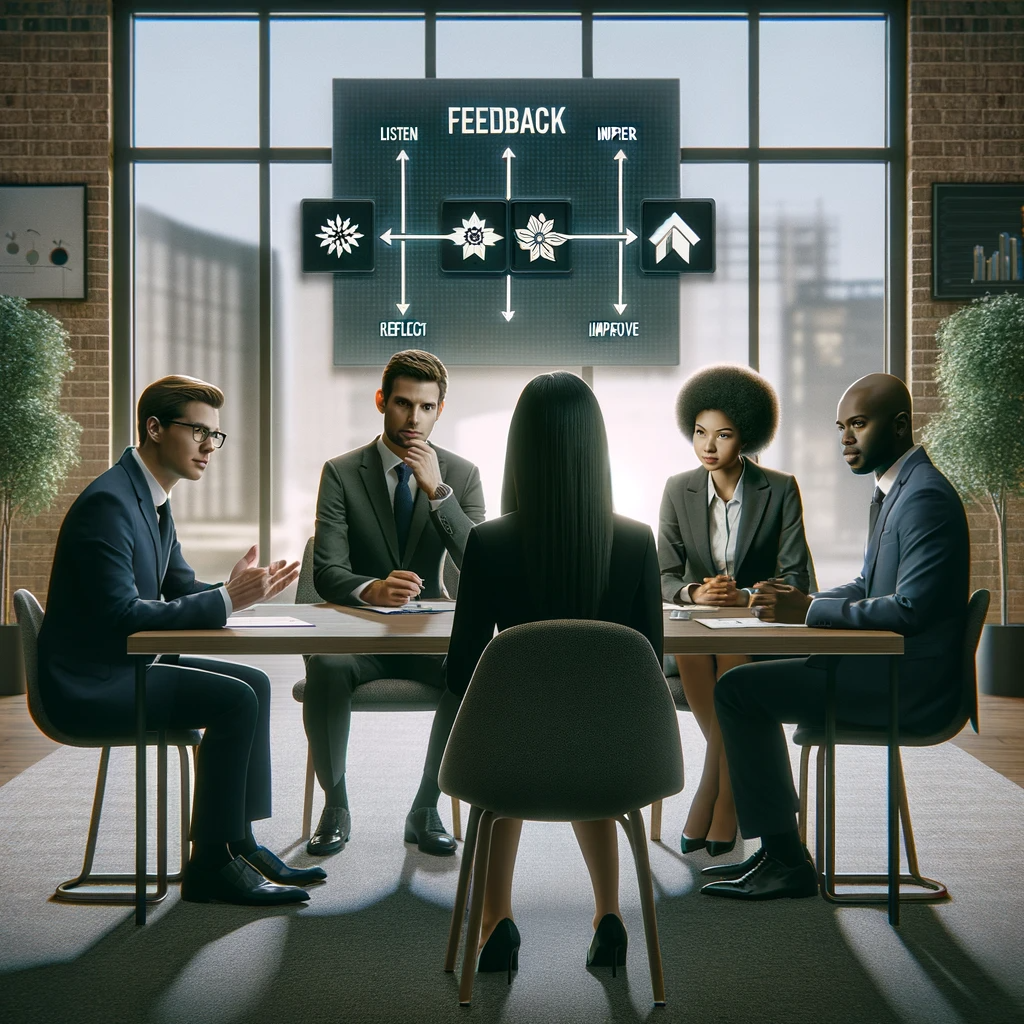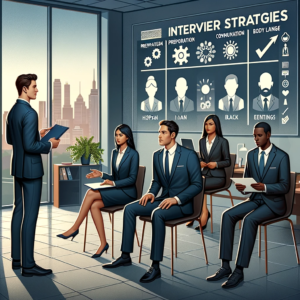Master Interview Strategies for Seasoned Candidates – Tips & Tricks
Unlock success in job interviews with proven strategies tailored for experienced professionals. Get practical tips for standing out!
Table of Contents

Interview Strategies for the Experienced Candidate: Understanding the Dynamics
In the realm of job interviews, understanding the dynamics is pivotal, especially for those armed with substantial experience. This section delves into how experienced candidates can use their career journey as a powerful tool during interviews. It’s about leveraging past roles and learnings to position oneself as an invaluable asset. We explore how seasoned professionals can effectively communicate their experience, aligning it with the potential employer’s vision and requirements. This approach underlines the essence of interview strategies for experienced candidates, ensuring they stand out not just for their years in the field, but for the depth and relevance of their experience.
Interview Strategies: Tailoring Your Approach
Tailoring your approach in an interview is more than just a strategy; it’s an art. This section focuses on how experienced candidates can align their vast experiences with the specific needs and challenges of the prospective employer. It’s about making a compelling case as to why your background is not just impressive but directly beneficial to the company. We discuss how to research a company thoroughly and use this information to make your experience resonate with the interviewer. From understanding the company culture to identifying key business challenges, this segment provides actionable insights on customizing your narrative to make a lasting impact.
Showcasing Achievements: A Core Element of Interview Strategies
A crucial aspect of interview strategies for experienced candidates is the ability to showcase achievements effectively. This section emphasizes the importance of quantifying your impact in previous roles. It’s not just about stating what you did, but illustrating how well you did it with tangible, measurable outcomes. We guide you on how to present your successes in a way that catches the interviewer’s attention, using metrics and specific examples to paint a vivid picture of your professional journey. This approach not only demonstrates your competence but also gives a glimpse into the potential value you could bring to the new role.

Problem-Solving Skills in Interview Strategies
This part of the article focuses on articulating problem-solving skills, a key component of interview strategies for experienced candidates. It’s about reflecting on past challenges and articulating how you navigated through them. We provide insights on how to structure your responses to showcase not just the problem and the solution, but also the thought process and skills you employed. This section helps you present your problem-solving abilities in a manner that highlights your strategic thinking, resilience, and adaptability, qualities highly valued in any professional setting.
Adaptability: A Vital Interview Strategy for Experienced Candidates
In this section, we discuss the significance of adaptability as a part of interview strategies for experienced professionals. It focuses on how to effectively communicate your ability to evolve with changing environments, technologies, and business strategies. We offer advice on how to reflect on your career for instances where you demonstrated adaptability, and how to present these instances in a way that underscores your readiness for future challenges. This part not only emphasizes the importance of adaptability but also guides on how to make it a compelling part of your interview narrative.
Communication Skills: Integral to Effective Interview Strategies
Effective communication is a cornerstone of successful interview strategies, particularly for experienced candidates. This segment delves into the art of articulating thoughts clearly and concisely, a critical skill in any professional setting. We discuss how to structure your responses, use language effectively, and convey complex ideas in an accessible manner. This section is designed to help you refine your communication skills, ensuring that you can express your extensive experience and ideas in a way that is both compelling and easy to understand.
Cultural Fit and Values: Essential in Interview Strategies
Aligning personal values with a company’s culture is a subtle yet powerful aspect of interview strategies for seasoned professionals. This section explores how to understand a company’s culture and demonstrate your fit. We discuss how to weave in aspects of your personal and professional values, making a case for how they align with the company’s ethos. This approach not only demonstrates your suitability for the role but also your potential as a long-term asset to the company.
Leadership Qualities in Interview Strategies
For those aiming for leadership roles, this part of the article focuses on how to showcase your leadership style and experiences. We guide you through articulating your approach to leading teams, handling conflicts, and driving results. This section helps you present your leadership qualities in a way that resonates with the needs of the role and the vision of the company.
Continuous Learning: A Key Topic in Interview Strategies
Emphasizing a commitment to continuous learning is a crucial strategy in interviews, especially for experienced candidates. This section discusses how to showcase your ongoing efforts to stay relevant and updated in your field. We offer advice on how to highlight formal education, self-directed learning, and professional development activities as part of your narrative. This demonstrates not just your expertise, but also your dedication to growth and adaptability.

Concluding the Interview: Strategies for a Lasting Impression
The final section provides strategies for concluding the interview in a way that leaves a lasting impression. We discuss how to effectively summarize your fit for the role, reiterating your interest and the unique value you bring. This is about leaving the interviewer with a compelling summary of why you are the ideal candidate for the position.
Leveraging Emotional Intelligence in Interviews
In the realm of interview strategies, emotional intelligence plays a critical role, especially for experienced candidates. This section addresses how to use emotional intelligence to connect with your interviewer. We discuss the importance of empathy, active listening, and the ability to read and respond to non-verbal cues. By mastering these aspects, candidates can create a rapport with the interviewer, demonstrating not just their professional competencies but also their ability to understand and adapt to social dynamics within the workplace.
Networking and Relationship Building: Pre-Interview Strategies
This part of the article shifts focus slightly to emphasize the importance of networking and relationship building as pre-interview strategies. We explore how leveraging your professional network can provide valuable insights into the company and the role you’re interviewing for. It’s about understanding the power of connections and how they can give you a competitive edge even before you step into the interview room. This section offers practical tips on how to utilize your network effectively to gather information, seek advice, and even potentially receive recommendations.
The Role of Personal Branding in Interview Strategies
Personal branding is an often overlooked aspect of interview strategies for experienced candidates. This segment delves into how to craft and convey your personal brand during an interview. We discuss identifying your unique value proposition, how it aligns with your career goals, and the ways to communicate it effectively. By establishing a strong personal brand, candidates can differentiate themselves, making a more memorable and impactful impression on the interviewer.
Handling Difficult Questions with Poise
Experienced candidates are often subjected to challenging and complex interview questions. This section provides strategies for handling such questions with poise and confidence. We cover techniques for structured thinking, staying calm under pressure, and turning difficult questions into opportunities to showcase your problem-solving skills and depth of experience. This part of the article is designed to equip candidates with the tools to navigate tricky interview scenarios successfully.
Post-Interview Strategies: Follow-Up and Feedback
The interview process doesn’t end with the interview itself. This final section of the article discusses the importance of post-interview strategies, such as sending a thoughtful follow-up message and seeking feedback. We offer guidance on how to frame follow-up communications to reinforce your interest in the role and the value you bring. Additionally, we emphasize the importance of seeking and constructively using feedback, regardless of the interview outcome, as a tool for continuous professional development.

In summary, this comprehensive guide on interview strategies for experienced candidates covers every aspect of the interview process – from understanding the dynamics and tailoring your approach to handling difficult questions and post-interview follow-ups. By employing these strategies, seasoned professionals can navigate their interviews with confidence, showcasing their wealth of experience as a significant asset to potential employers.
FAQs on Interview Strategies for the Experienced Candidate
- How can an experienced candidate demonstrate their industry expertise effectively during an interview? An experienced candidate should use specific examples from past roles to illustrate their expertise and relate these experiences to the potential role’s requirements.
- What are the key strategies for negotiating salary and benefits for a candidate with substantial work experience? Leverage your experience by researching industry standards, clearly articulating your value, and being open to negotiation and alternative compensation methods.
- How should an experienced job seeker handle questions about their previous roles and responsibilities? Focus on achievements and learning experiences from past roles, and connect these to how they can benefit the new role.
- What are effective ways for an experienced candidate to showcase their leadership skills in an interview? Discuss leadership roles and initiatives taken in previous positions, emphasizing outcomes and team development.
- How can a candidate with many years of experience tailor their interview responses to align with the company’s current needs and culture? Research the company’s values and recent initiatives, then highlight relevant aspects of your experience that align with these areas.
- What strategies can an experienced professional use to address gaps in their employment history during an interview? Be honest about employment gaps, explaining them positively as periods of learning or personal growth.
- How should experienced candidates prepare for behavioral interview questions? Use the STAR method (Situation, Task, Action, Result) to structure responses, focusing on situations that highlight relevant skills and achievements.
- What are the best ways for a seasoned professional to research and prepare for an interview in a rapidly evolving industry? Stay updated with industry trends, use professional networks for insights, and demonstrate a continuous learning mindset during the interview.
- How can experienced candidates effectively communicate their adaptability and willingness to learn new skills in an interview? Give examples of past instances where you adapted to change or learned new skills, showing enthusiasm for growth and challenges.
- What techniques can experienced job seekers use to leave a lasting, positive impression on the interviewers? Be engaging, ask insightful questions, and send a follow-up thank you note post-interview to reinforce your interest and professionalism.


An fascinating discussion is price comment. I believe that it’s best to write more on this topic, it might not be a taboo subject but generally people are not enough to speak on such topics. To the next. Cheers
Your point of view caught my eye and was very interesting. Thanks. I have a question for you.
Thanks! Please post your question